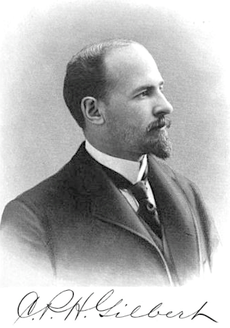Charles Pierrepont Henry Gilbert
| C. P. H. Gilbert | |
|---|---|

Gilbert circa 1900
|
|
| Born |
Charles Pierrepont Henry Gilbert August 29, 1861 New York City |
| Died | November 25, 1952 (aged 91) Pelham Manor, New York |
| Nationality | American |
| Occupation | Architect |
| Buildings |
Harry F. Sinclair House Joseph Raphael De Lamar House Morton F. Plant House Felix M. Warburg House Otto H. Kahn House |
Charles Pierrepont Henry Gilbert (August 29, 1861 in New York City – October 25, 1952), most often referred to as C. P. H. Gilbert, was an American architect of the late-19th and early-20th centuries best known for designing townhouses and mansions.
Gilbert's family comes of English and New English ancestry. One of the members was Sir Humphrey Gilbert, to whom Queen Elizabeth I of England granted a patent for the colonization of North America. Sir Humphrey's ambitious plans ended when he was lost at sea with most of his company on his return voyage from the exploration of Newfoundland. Other members of the family, however, soon planted the name in North America.
His father was Loring Gilbert, a direct descendant of John Gilbert, the second son of Giles Gilbert of Bridgwater, Somerset, England, who came to America early in the 17th century and settled at Dorchester, near Boston, and died at Taunton, Massachusetts, in 1654. Loring Gilbert was a leading commission merchant who had a successful career. He married Caroline C. Etchebery, and they had one son, Charles Pierrepont Henry Gilbert. Loring Gilbert died in 1893.
C. P. H. Gilbert received a careful education, studying both in America and in Europe, such as the École des Beaux-Arts in Paris. After being prepared for college he took special courses in civil engineering and architecture, and later studied painting, sculpture and the fine arts in general. After college, he began practical work as an assistant in the office of a prominent firm of architects, where he received the training necessary to prepare him for engaging in his own business. As a young man he designed buildings in the mining towns of Colorado and Arizona before returning to New York around 1885.
...
Wikipedia
